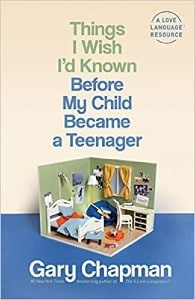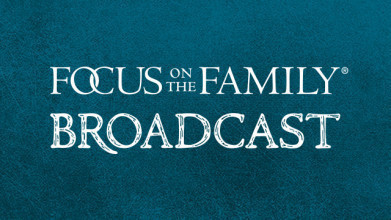Preview:
Dr. Gary Chapman: They are gonna be greatly influenced by our model more than anything we say by our model. So if they turn out to be like me in this particular area, am I gonna be happy with that? If not, I need to be changing it now. And I need to go ahead and apologize for my past failures with this and make those changes.
End of Preview
John Fuller: Mm. That’s Dr. Gary Chapman and he’s us today on Focus on the Family. Your host is Focus president and author, Jim Daly. Thanks for joining us. I’m John Fuller.
Jim Daly: Uh, John, when your child reaches the teen years, I mean, you’re looking at a lot of ups and downs-
John: Mm-hmm
Jim: … highs and lows. And teens do test the limits and oftentimes pushing those buttons that we have as parents as they battle for their independence. And we try to defend and (laughs) not allow that independence. Uh, here at Focus on the Family, we do want to help you in that journey as a parent and to do a great job so that when they’re in their twenties and thirties, you’ve got a great and strong relationship with them.
John: Mm-hmm. Yeah.
Jim: That’s what it’s about. And hopefully, in that, that they have a relationship with the Lord, which is all of our, parents, heart’s desire. And our guest today, Dr. Gary Chapman, is, uh, probably the, the order of his accreditation here is he’s a dad, a granddad, a family counselor. And Dr. Chapman has some great insights and to help us better understand the teen brain and how we can (laughs) better get through that time together.
John: Mm-hmm. Yeah, this is gonna be a really good conversation. Dr. Chapman is no stranger to Focus on the Family. Uh, he’s been here a number of times talking about various, uh, aspects of the five love languages. Uh, he is an author, speaker, pastor, counselor. And, um, today we’re gonna be talking about some of the content in one of his books, Things I Wish I’d Known Before my Child Became a Teenager.
Jim: It’s a very accurate title. (laughs)
John: (laughs) Yeah, there are a lot of things you want to know before (laughs) your child becomes a teenager.
Jim: Help is another way of saying that. (laughs)
John: And we do have copies of that book here at the ministry. Just give us a call or stop by focusonthefamily.com/broadcast.
Jim: Gary, welcome back to Focus.
Dr. Chapman: Well, thank you. It’s great to be back.
Jim: It’s so good to have you here. And, uh, the teen years, uh, as we were just bantering about, (laughs) John and I, can really be challenging. And it is a scream for help from a lot of parents, ’cause yeah, they don’t know what to do. I’m gonna put you on the spot. What were those years like for you in your own family?
Dr. Chapman: Well, you know, with our daughter, they were really easy.
Jim: (laughs) Love the girls.
Dr. Chapman: And then our son came along (laughs), and I realized why people had trouble raising children. (laughs)
Jim: (laughs) But that can go both ways. Right?
Dr. Chapman: You’re right.
Jim: I mean, you really can, but in your case, yeah. So that was your challenge, was your son.
Dr. Chapman: Was, was our son. Yeah. Yeah. Our daughter from the very beginning, you’re, as a child and through the teenage years, she was just basically compliant, and she knew where she was going. She said when she was eight years old, I’m gonna be a doctor when I grow up. And so in high school she took three years of chemistry and three years of Latin (laughs), and she went on to be a doctor. My son who was four years younger than her, as all this began to unfold, he said, you know, Shelly’s gonna miss a lot of life. She’s too focused. (laughs)
Jim: (laughs) That sounds like a fun, young man. (laughs) But in that, in that context for all of us, uh, and maybe some listening and viewing right now, they’re living it.
Dr. Chapman: Yeah.
Jim: They, they have the teenagers in the home and their ears are all tipped in on this conversation. What causes that turbulence? Why-
Dr. Chapman: Mm-hmm.
Jim: … why do we laugh? You know, humors rooted in truth.
Dr. Chapman: Yeah.
Jim: Why do we laugh about the teen years? Because it is true. It’s turbulent.
Dr. Chapman: It, it is true, you know? I remember the, uh, the mother who said to me, she said, uh, Dr. Chapman, she said, I don’t know what’s happened to my son. She said, since he became a teenager, he’s questioning everything I s- have said through the years. And she said, it just like his brain has changed. And I said, you guessed it. (laughs) His brain has changed, you know?
Jim: Yeah. That’s what’s happening.
Dr. Chapman: And the brain is refocusing during those, uh, teenage years. And so yeah, there are things happening. They are thinking differently. And, uh, one of the things is they’re thinking now more logically. And, uh, I didn’t say they’re, they’re logical. I just said they’re (laughs) beginning to develop-
John: Yeah.
Dr. Chapman: … logical thought, you know? Uh, and so they’re going to question things. And so we have to learn how to work with that rather than working against that.
Jim: Right. And you say in the book that you need to really remember it’s developing.
Dr. Chapman: Yeah. Absolutely.
Jim: It’s not developed.
Dr. Chapman: (laughs) Absolutely.
Jim: Man, I’m telling you, when you’re in the heat of battle with your teenager, that’s hard as the adult to remember that, that they’re not there. I mean, I saw research, and you’re into all the research, uh, a boy’s brain isn’t fully developed till 25.
Dr. Chapman: 25.
Jim: Now, how many parents just went, duh. (laughs) But it is so true. And, uh, describe those attributes of the, of the teen brain. What, what is going on?
Dr. Chapman: Well, I think one of them is what we just mentioned, that is they are beginning to think logically. And consequently, they’re questioning almost everything. Things we’ve taught them their whole lifetime, they’re questioning those things. Is that really true? And, uh, they’re gonna ask us questions. And we’re gonna either help them work through that, or we’re gonna shut it down by saying, you know, better than that. I’ve taught you that have, different from that, you know?
Jim: Mm-hmm
Dr. Chapman: And so we’ve gotta learn to cooperate with that. The other thing I think in the brain what’s happening is the emotional part of the brain is going through some changes. So they’re really high and really low. In the morning, they can just be so jovial, and everything seems wonderful. And they go off to school and come back that evening and they’re in the pits.
Jim: Yeah.
Dr. Chapman: You know, something happened today. It influenced them in a negative way. And now they’re in the pits. So… And the parents, this is hard to understand. Because this morning you were this way and the night, you’re this.
Jim: Yeah.
Dr. Chapman: But it’s, it’s a part of the, the development of the brain.
Jim: It’s so true. I think those emotional waves are… And again, I only have the boys. So John, you’ve, you’ve got three girls. So jump in.
John: We’ve had plenty of emotions. (laughs).
Jim: But, but, you know, boys, from what I understand and what I experience, they’re fairly predictable. They’re pretty straightforward. They can be too much so, you know. Whether it’s physical aggression or all of that. And they’re very action-oriented, typically. Where, from what I’ve heard from my dad friends with girls is it’s very emotional.
John: Yeah.
Jim: You know, something just goes wrong, and you don’t even understand what, what the conversation is (laughs) right now. Was that your experience?
Dr. Chapman: Yeah. I think it can be true. Uh, but I don’t think it’s true for all girls or all guys.
Jim: Yeah. Its 80/20.
Dr. Chapman: Right. Yeah.
Jim: In fact, you, your son Derek, you had that explosive moment that you described him in the book when he was a teenager, and something took place. First, what happened? Ha- how did you manage it?
Dr. Chapman: Mm-hmm
Jim: And how did you repair the damage in it?
Dr. Chapman: Well, it had to do with anger. And, uh, we got into an argument one night. I think he was probably 14 at the time. And, uh, I was yelling at him-
Jim: Mm-hmm
Dr. Chapman: … and I said hateful things to him. And he was yelling at me and said hateful things to me. And in the middle of that argument, he just walked out of the room and walked out the front door and slammed the door.
Jim: Mm-hmm
Dr. Chapman: And when he did, I woke up.
Jim: Mm-hmm
Dr. Chapman: And I thought, oh God, I thought I was further along than this yelling at the son I love.
Jim: Mm.
Dr. Chapman: And I sat down on the couch and just started crying. And I just confessed my sin to God. And I, I really said, Lord, I thought I was further along than this, that I would never do this.
Jim: Mm-hmm
Dr. Chapman: And in time, I don’t know how long, but in time, my son walked back in the house. And when he did, I said, Derek, could you come in here a minute, son? And he came, sat down. And I just poured my heart out to him.
Jim: Mm-hmm
Dr. Chapman: I said, Derek, I, I wanna apologize to you. A father should never talk to a son the way I talked to you. And I said, I said some hateful things, and that’s not the way I feel about you. I love you. And I just poured my heart out. And I finally said, I, I just, I hope you can forgive me.
Jim: Yeah.
Dr. Chapman: And he said, dad, that was not your fault. I started that. And I shouldn’t talk to you that way. And when I was walking up the street, I asked God to forgive me.
Jim: Mm-hmm
Dr. Chapman: And I want to ask you to forgive me.
Jim: Yeah.
Dr. Chapman: Phew! And we hugged each other, and we cried, and we hugged each other, and we cried. And when it was, when, when that it was all over and we both kind of calmed down, I said, Derek, why don’t we try to learn how to process anger in a positive way and talk our way through anger rather than yelling our way through anger. So what if the next time you’re angry at me, you just say, dad, I’m angry, can we talk? And I’ll sit down with you and just listen.
Jim: Huh.
Dr. Chapman: And the next time I’m angry with you, I’ll just say, Derek, I’m angry, can we talk? And let’s learn how to do this. And that was a huge turning point in our relationship.
Jim: Yeah. Boy, I would think when he came back to the house and you had that exchange of forgiveness, really, you had to turn around and go, okay, maybe we’re further along than I thought. (laughs)
Dr. Chapman: Yeah.
Jim: I mean, that’s the irony.
Dr. Chapman: Yeah.
Jim: But that’s the issue with anger. It’s such a flash.
Dr. Chapman: Yeah.
Jim: I mean, there’s something in us that’s triggering us.
Dr. Chapman: Yeah.
Jim: And it’s like we don’t like who we are in that moment.
Dr. Chapman: Yeah.
Jim: Especially those of us that believe in Christ. Right?
Dr. Chapman: Yeah.
Jim: It’s not a pretty sight. It’s an ugly side of our flesh.
Dr. Chapman: Yeah. You’re right. You know, what’s so unfortunate, Jim, as, you know, some parents go through those situations again and again and again. And that’s when the child checks out. And sometimes they run away from home. They leave.
Jim: Right.
Dr. Chapman: Or they make it till they get through a high school and then they just don’t have anything to do with their parents. And that’s what’s tragic. And that’s why I say to parents, when you recognize that what you’ve done or said is not loving and kind, apologize. And sometimes parents say, but if I apologize, uh, won’t they lose respect for me? And I say, no, no, no. They gain respect.
Jim: Right. Absolutely.
Dr. Chapman: They already know that what you did was wrong, you know?
Jim: Yeah. No, it’s so true. Um, Gary, I, I do appreciate that, um, idea of apologizing. There is that next step that you talk about in the book though, and that is the ability to forgive.
Dr. Chapman: Yeah.
Jim: So I, I don’t know, sometimes I might think of those two as one and the same, but you are saying, no, they’re two different acts.
Dr. Chapman: I think apology is when we acknowledge our own failure to the other person.
Jim: Mm-hmm.
Dr. Chapman: And in the book, I discuss five different ways that people do apologize because we have different ideas on what apology means. And we can discuss those if you like. But I think in a response to an apology, the biblical response is forgiveness. You know, we’re told in Ephesians 4 that we’re to forgive in the same way God forgives us. Well, how does God forgive us? When we confess our sins, God forgives us.
Jim: Mm.
Dr. Chapman: So when the person apologizes to us, we’re following a godly model when we forgive. And forgiveness is not a feeling. Forgiveness is a choice. It’s a choice to pardon the person, I’m not gonna make you pay for this, and to remove the barrier that the offense has created between us.
Jim: Mm-hmm
Dr. Chapman: Because every time we have that kind of experience, it puts an emotional block in a wall between us.
Jim: Mm-hmm
Dr. Chapman: And forgiveness removes the block, so that now our relationship can go forward.
Jim: No, that’s so good. I do want to hit those actually, the five languages of apology. So if we can, let’s, let’s go through those.
Dr. Chapman: Mm-hmm
Jim: I think the first one is expressing regret. Um, let me ask a, a, you know, kind of a tough question. What if you’re teenager doesn’t really connect with regret? (laughs)
John: Yeah. They’re not seeing the point to regret.
Jim: You know, they haven’t developed that ability to have regret.
Dr. Chapman: Yeah.
Jim: Um, ha- how does a parent steer their teenager into feeling regret?
Dr. Chapman: Yeah. I don’t know that we can trigger their emotions, but we can give them a model.
Jim: Hmm.
Dr. Chapman: And they’re far more likely to follow our model anyway-
Jim: Right.
Dr. Chapman: … than they are our words.
Jim: Right.
Dr. Chapman: But expressing regret often is done with the words I’m sorry. In fact, this is one of the most common ways that people apologize, I’m sorry. But don’t ever stop with those words. Tell them what you’re sorry for.
Jim: Specifically.
Dr. Chapman: Specifically. I’m sorry that I lost my temper and yelled at you.
Jim: Yeah.
Dr. Chapman: Because if you simply say I’m sorry, that, that can be trite to a lot of people. It doesn’t connect to very em- emotionally with them. But you tell I’m sorry that I… And don’t ever put the word but in there.
Jim: Mm-hmm
Dr. Chapman: I’m sorry that I dah, dah, dah, but if you had not, then I would not.
Jim: Yeah.
Dr. Chapman: And now you’re blaming them-
Jim: Right.
Dr. Chapman: … for your behavior.
Jim: Mm.
Dr. Chapman: So expressing regret is one of the ways to apologize. Another way is accepting responsibility.
Jim: Mm-hmm
Dr. Chapman: I was wrong. I should not have done that. There’s no excuse for that. I take full responsibility for it.
Jim: Our culture is not good at this.
Dr. Chapman: You’re right. You’re right.
Jim: (laughs) I mean this is… And we’re getting worse at it.
Dr. Chapman: Yeah.
John: Hmm.
Dr. Chapman: I think this is really the first step in teaching a child how to apologize.
Jim: Mm-hmm
Dr. Chapman: A four-year-old breaks a cookie and says it broke. It broke.
Jim: (laughs) Yeah.
Dr. Chapman: And the parents says, honey, let’s say that a different way, I broke the cookie. It’s not a sin to break a cookie.
Jim: Right.
Dr. Chapman: We’re just helping them to accept responsibility.
Jim: Right.
Dr. Chapman: And for some people, a, a, you’re not sincere if you don’t accept responsibility, if you don’t admit that what you did was wrong.
Jim: Mm-hmm
Dr. Chapman: And then a third way of expressing apology is offering to make restitution. How can I make this up to you?
Jim: Right.
Dr. Chapman: I know I’ve heard you deeply, but I wanna make it right. And if this what they consider to be a sincere apology, they’ll have an idea on what you can do to make it right. And then expressing the desire to change my behavior. I don’t want to do that again. I don’t like what I did. And I don’t wanna do it again. Can you help me? Can we talk? Can we get a plan that I won’t do that again?
Jim: Mm-hmm
Dr. Chapman: And then the last is actually requesting forgiveness. Will you forgive me? I hope you can find it in your heart to forgive me.
Jim: Yeah.
Dr. Chapman: So I think one of the things I suggest in this book is, uh, with children that are just before the teenage years or when they’re in the teenage years is to have a, have a family discussion about apology.
Jim: Yeah.
Dr. Chapman: Yeah. What, what does, what does every-
Jim: Mm-hmm. That’s a great idea.
Dr. Chapman: What does everybody think here is, is a sincere apology? Because we grew up, all of us grew up with some idea that we learned from our parents.
Jim: Mm-hmm
Dr. Chapman: You know, that either I’m sorry. And maybe that’s all we’ve ever learned. I’m sorry. So what, what is your idea of what a sincere apology sounds like? And then discuss these five different ways, because these are ways, we discover with thousands of people that these five-way, fives are very common.
Jim: Yeah.
Dr. Chapman: So what we’re doing now is getting on the front burner of our teenagers and our, and, and ourselves that there are gonna be times they’re gonna have to apologize to each other. Because I’m not gonna be a, a perfect father or a perfect mother. And you’re not gonna be perfect teenagers. You don’t have to be perfect, but we wanna deal with our failures. So when I hurt you, uh, if I, if I don’t come to you and apologize, you come to me and say, dad, I think you owe me an apology. A, and so I’ll… You tell me about it? And you tell me what you heard me say or do and I’ll, and I say, oh, I, I’ll get it. You know?
Jim: But I like that idea of inviting that.
Dr. Chapman: Yeah. Inviting it.
Jim: That makes a, a huge difference.
Dr. Chapman: Yeah. If you invite it, they’ll come.
Jim: Right. (laughs)
Dr. Chapman: They’ll come and tell you; you know. (laughs) But we’re, we’re saying this is a huge part of our family. We wanna learn how to apologize. And then we wanna learn how to forgive. And here’s what it means to forgive. And we talk about forgiveness.
Jim: That is a great idea.
John: Yeah.
Jim: Mm.
John: Just pray up before you make that invitation. (laughs) (laughs) Be ready and be open and be real about that.
Dr. Chapman: Right.
John: Well, Dr. Gary Chapman is our guest today on Focus on the Family. And, uh, we’re so glad you’ve joined us. Things I Wish I’d Known Before My Child Became a Teenager is, uh, the book that we’re covering today. And you’re gonna find details about it and, uh, uh, the five languages of apology is a crucial part of it, uh, at our website, focusonthefamily.com/broadcast. Or call 1-800, the letter A, and the word FAMILY.
Jim: Uh, Gary, you have a illustration… Of course, you’re counseling with lots of families and have done so for years, but you have a story about 13-year-old that you counseled after he ran away from home. What happened?
Dr. Chapman: Well, in the course of our conversation, he said to me, my parents don’t love me. They love my brother, but they don’t love me. I knew his father and mother. I knew they loved him. The problem is they had never learned how to communicate love to him.
Jim: Mm-hmm
Dr. Chapman: They had never learned what I call his love language.
Jim: Right.
Dr. Chapman: And so, uh, you know, in the course of conversation and later on in counseling with the parents, we brought, brought up this idea they weren’t familiar with, the con- concept of love languages. And that this son has a love language that’s different from your other son. And so he doesn’t feel loved even though you love him.
Jim: Right.
Dr. Chapman: And so the whole concept of the five love languages applies in those teenage years. Because if a teenager doesn’t feel loved by the parents, they’re not gonna be healthy emotionally.
Jim: Yeah.
Dr. Chapman: They’re not gonna relate well to the parents. And chances are, they won’t relate well to other people.
Jim: Well, what’s so critical about that, and I, I think we all fall prey to of this, is we think of that relationship from our viewpoint.
Dr. Chapman: Yeah.
Jim: You know, I’ve said, I love you.
Dr. Chapman: Yeah.
Jim: I’m doing all the things that express love to you, but it’s missing the mark because that’s not their love language.
Dr. Chapman: Yeah.
Jim: Which is really critical. To remind people of that or to introduce people to that, what are the five love languages, quickly?
Dr. Chapman: Well, their five ways to express love on an emotional level, whether it’s with bo- husbands and wives or with parents and children. One is words of affirmation, just looking for things that you can honestly, genuinely affirm them for. And then one is, uh, acts of service.
Jim: Mm-hmm
Dr. Chapman: Doing something for them that you know they would like for you to do. Cooking a meal is an act of service. Fixing their special meal that they really like as a teenager is an act of service. Quality time, giving them your undivided attention. That means when your teenager is talking with you, you give them your full attention. You’re not looking at your computer or the television or reading a magazine. You’re giving them full attention. And it doesn’t always mean you’re talking. Sometimes you can just be walking down the road with them and having time together. Or doing something they really want you to do with them. Quality time. And then physical touch. We’ve long known the emotional power of physical touch. And for some teenagers, this is their language. If you see them always hugging each other and hugging other people or patting people on the back, you’d pret- be pretty sure that’s what they want for themselves. You know.
Jim: Right.
Dr. Chapman: And then, uh, the, the last one is receiving gifts. And for some teenagers, gifts is their primary language.
Jim: Yep.
Dr. Chapman: Don’t hear me saying, if that’s their language, give them everything they want.
Jim: Right.
Dr. Chapman: No, no, no. We love them too much to do that. Even God doesn’t do that.
Jim: Right.
Dr. Chapman: (laughs)
Jim: But I like that concept of it. What they’re experiencing in that is that you are thinking of me.
Dr. Chapman: Yeah. You’re thinking-
Jim: I like putting it in that context, ’cause I, I think you’ve used the reference that you can give your teenager a rock-
Dr. Chapman: Yeah. (laughs)
Jim: … cause it has certain colors that reminded-
Dr. Chapman: Yeah.
Jim: … uh, you have that teenager. And they’ll, they may save that gift.
Dr. Chapman: Yeah.
Jim: Which you would never save a rock, right?
Dr. Chapman: Yeah.
Jim: But for them it meant something.
Dr. Chapman: Or you can be taking a walk and find a bird feather-
Jim: Yeah.
Dr. Chapman: .. and just brushed it off and take it home.
Jim: Right.
Dr. Chapman: And if, if gifts is their language, that teenage son is that his language saying, man, I found this and I thought about you. Man, look at the colors in this thing.
Jim: Yeah.
Dr. Chapman: I don’t know what bird… What bird do you think this came up? I want you to have this.
Jim: Yeah. He-
Dr. Chapman: He’ll, he’ll see it, he’ll see it as a gift.
Jim: Yeah.
Dr. Chapman: You were thinking about him.
Jim: Gary, you also talk about the need for teens, uh, to learn an attitude of service. Uh, I can’t imagine a more difficult time for some-
Dr. Chapman: Yeah.
Jim: … to apply this principle, you know?
John: (laughs) Yeah.
Jim: Wake up early Saturday morning because we’re gonna to go to the pet farm and, you know, scoop (laughs) pet doodoo. (laughs) We did that, actually.
Dr. Chapman: (laughs)
Jim: Jean and I. Jean signed us up to go to a, it was a animal restoration place. You know, she loves animals. And so she signed us up to volunteer. (laughs) And we were literally cleaning stalls-
Dr. Chapman: (laughs)
Jim: … of ducks and all kinds of things. You know scooping the aftermath of their good eating habits.
Dr. Chapman: (laughs)
Jim: But, uh, but it was good.
Dr. Chapman: Yeah.
Jim: I think the boys really did learn, uh, a little active service and all that.
Dr. Chapman: Yeah.
Jim: But why is that so important?
Dr. Chapman: Well, I think this is the lifestyle of the Christian when you really get down to it.
Jim: Mm-hmm
Dr. Chapman: You know, Jesus said about himself, I did not come to be served. I came to serve and to give my life a ransom for others. So, uh, it’s so important in, particularly in Christian families, that we have an attitude of service. And I think the teenager is far more likely to come into this if they see us serving other people.
Jim: Yeah.
Dr. Chapman: I remember when, when I was growing up and I was a teenager, I, I don’t know that my parents ever talked to me about serving others-
Jim: Mm-hmm
Dr. Chapman: … but I watched them. My dad would mow lawns for people when they were in the hospital. My mother would bake food and make food and take it to them, or, you know? And, and I saw them doing things like this for people all the time. And so I, I bought into that. I mean, I saw that, you know?
Jim: Yeah.
Dr. Chapman: And so I think, uh, I think our model, first of all. And then yes, we’re gonna discuss this. And yes, bring them into that. I remember when our teenagers, uh, uh, our kids were teenagers, one of the things I did in the fall, when the leaves were falling, I’d get, put rakes in the back, uh, of the car. We’d drive through the neighborhood and look for houses where the leaves were still in the yard. And I’d knock on the door and say, I’m Gary Chapman, and, uh, we live down in the neighborhood and I’m trying to teach my kids how to serve other people. And if you don’t mind, we’d like to rake your yard for you.
Jim: (laughs)
Dr. Chapman: And they would say-
Jim: Like what?
Dr. Chapman: … say what. (laughs) And I’d repeat my little speech-
Jim: That’s good.
Dr. Chapman: … and they’d say, oh, I’d be happy for you to. I’ll pay you to, to rake my leaves. And I say, no, I don’t want any money. I’m just trying to teach them how to serve people. And I, I never found anybody that wouldn’t let us do that.
Jim: Yeah, I bet. (laughs)
Dr. Chapman: And the kids got out there and they loved it. And the part they really liked when you get them in the pile-
Jim: Oh, yeah.
Dr. Chapman: … you jump in the pile. (laughs)
Jim: Gotta be.
John: I’ll make sure to give Gary my address.
Dr. Chapman: (laughs)
Jim: No kidding. I wish you were my neighbor. (laughs) No, that’s so good. Gary, you ask a great question in the book, which I think is a, a tremendous place to land today.
John: Mm-hmm
Jim: And that is, um, as a parent, you ask yourself and encourage other parents to ask themselves, what if my teen turns out to be just like me? And what is your point in that? Whether you have fear in the answer or comfort in the answer, I would imagine?
Dr. Chapman: Well, you know, it’s really the most serious question I ever asked myself.
Jim: Mm-hmm
Dr. Chapman: And I’m glad I did because I changed some things. So I, I challenge, uh, parents of teenagers to, to ask yourself what if they handle anger the way I handle anger? Cause I realized they’re, the story I told earlier.
Jim: Yeah.
Dr. Chapman: My son was yelling at me cause he learned it from me.
Jim: Yeah.
Dr. Chapman: And, and, and what if, what if they treat… why wouldn’t they get older if they treat their spouse the way I treat mine?
Jim: Mm-hmm
Dr. Chapman: Uh, what if they drive a car the way I drive a car.
Jim: Okay. Now you’re getting close. Ouch.
Dr. Chapman: (laughs) What if they have the same work ethic that I have? And what if they talk to other people the way I talk to other people? And what if they talk about people who are different from them the same way I do? And what if they respond to alcohol and drugs the way I did? And what if they have the same quality of relationship with God that I have? And I go on in the book with a few more of those. (laughs)
Jim: That is worth it right there to get the book.
Dr. Chapman: Yeah.
Jim: I don’t know if that’s in the back or the front, (laughs) but I’ll take it home and look at that. (laughs) But those are good thought-provoking questions. You know, uh, Jean and I were just talking about this the other night, ’cause she said something to me, it sounded, I mean just like her mom. And I stopped her. I said, oh my goodness, that sounded just like your mom. And she goes, it did, didn’t it?
Dr. Chapman: (laughs)
Jim: And we started talking about how often we are-
John: Mm-hmm
Jim: … expressing those emotions or those verbal lashes-
Dr. Chapman: Yeah.
Jim: … the way we got it from our parents. And then we turn around and do it to those around us. Right?
Dr. Chapman: Yeah. It will help us to begin to change some things in our lives.
Jim: Yeah.
Dr. Chapman: We ask those questions of ourselves and then say, okay, I need to ask God to transform me in this area.
Jim: Well, that’s a great place to land Gary. This has been so good.
John: Mm-hmm
Jim: And thank you, um, you know, for again, awakening our hearts to what’s the goal here, uh, to win an argument, to win a debate. I’m telling you, with teenagers, that ain’t it.
Dr. Chapman: Yeah.
Jim: You’ve got to look at the big picture. And I… Let me ask that in, in, in the last question here. Thinking of your 15-year-old as a 40-year-old. And is there benefit in that?
Dr. Chapman: I think…
Jim: It’s kind of the answer to your question too.
Dr. Chapman: Yeah.
Jim: Who are they gonna to be?
Dr. Chapman: Yeah, I think so. Because they are gonna be greatly influenced by our model more than anything we say by our model. So if they turn out to be like me in this particular area, am I gonna be happy with that? If not, I need to be changing it now. And I need to go ahead and apologize for my past failures with this-
Jim: Mm-hmm. Yeah.
Dr. Chapman: … and make those changes.
Jim: What a great.
John: Mm-hmm
Jim: I hope you’ve enjoyed this. Uh, there’s so many resources here at Focus to help you in the journey. I think everything that Gary has written, we offer. And, uh, certainly will tag to the, uh, the link to the website-
John: Mm-hmm
Jim: … to, uh, let you be able to take the test to see, or the quiz to see what your love language is. I would encourage you to apply it. And especially when it comes to teens, this great book, Things I Wish I’d Known Before My Child Became a Teenager. Uh, the other title to that book is Help Me. (laughs) So, uh, it is a wonderful resource and one that you need as a parent. I mean, these are tools. Don’t go do this blindly.
John: Mm-hmm
Jim: Uh, there’s plenty of help here. And Gary is best at this, uh, education for us as parents to do it better. So Gary, again, thank you for being with us.
Dr. Chapman: Thank you.
Jim: And if you would like to invest and get a copy of the book, uh, get a hold of us. We’ll send you a copy. If you can help us financially, we’ll send you a copy of the book as our way of saying thank you, either monthly or a one-time gift. And if that’s too much and you’re unable, we, we’ll provide it for you. We’re gonna trust others will take care of the cost of that. Just get ahold of us.
John: Mm-hmm
Jim: We have caring Christian counselors that can help you as well if you’re in a real parenting pickle. Uh, let us give you some advice and provide other resource, probably mostly Gary’s stuff (laughs) that can help you.
John: Mm-hmm. Yeah. Reach out to us. Donate as you can. And, uh, request that book Things I Wish I’d Known Before My Child Became a Teenager. And as Jim said, we’ll, uh, link over to the quiz that, uh, Gary mentioned earlier as well. Our website is focusonthefamily.com/broadcast or call 1-800, the letter A, and the word FAMILY. 800-232-6459. Well, plan to join us again tomorrow. Dr. Juli Slattery will describe how, as a wife, you can help build a more intimate marriage.
Preview;
Dr. Juli Slattery: But actually, to build an intimate relationship, you have to get through the disappointment. Because otherwise you’re just loving each other based on sort of a selfishness of what you’re doing for me. But when you get disappointed, when it actually costs you something to love and to reach towards that other person is when you start putting true bricks in the wall of intimacy.
End of Preview
John: On behalf of Jim Daly and the entire team, thanks for joining us today for Focus on the Family. I’m John Fuller, inviting you back as we once again help you and your family thrive in Christ.




















